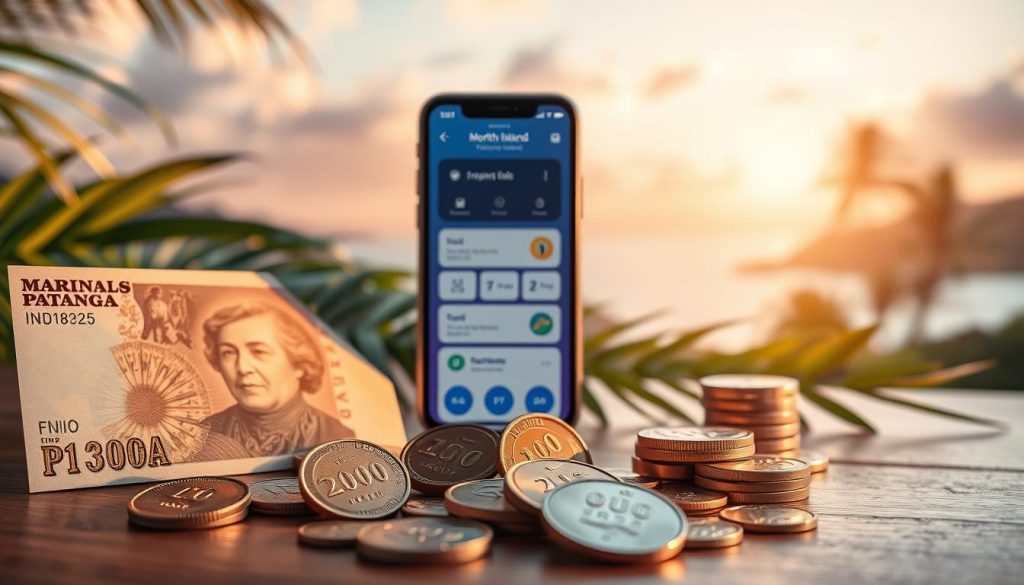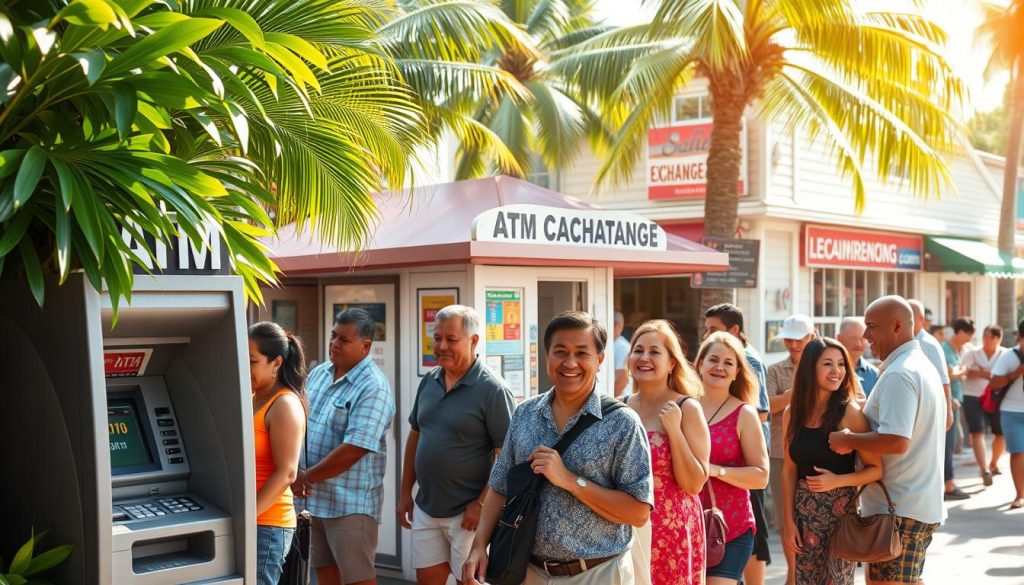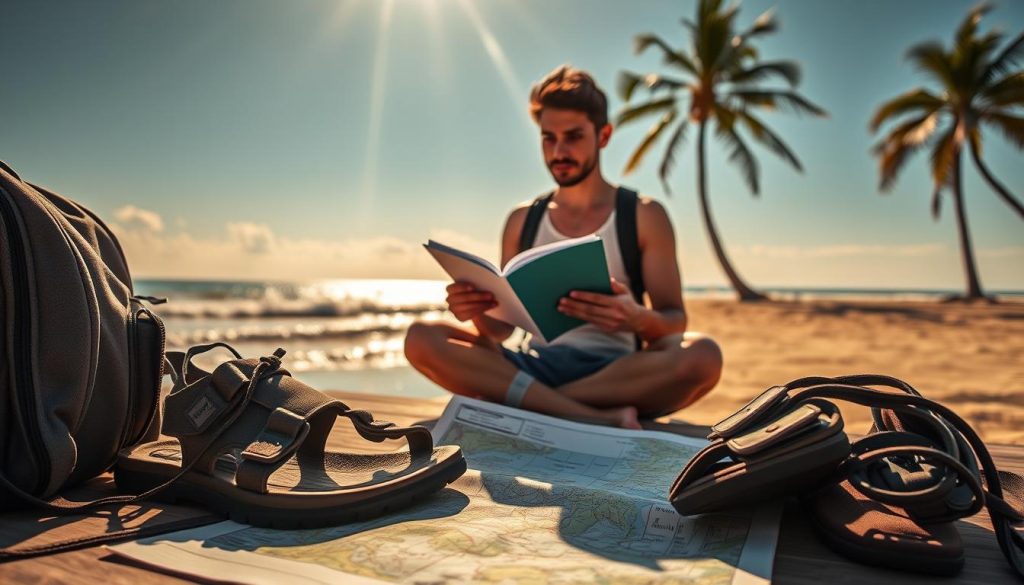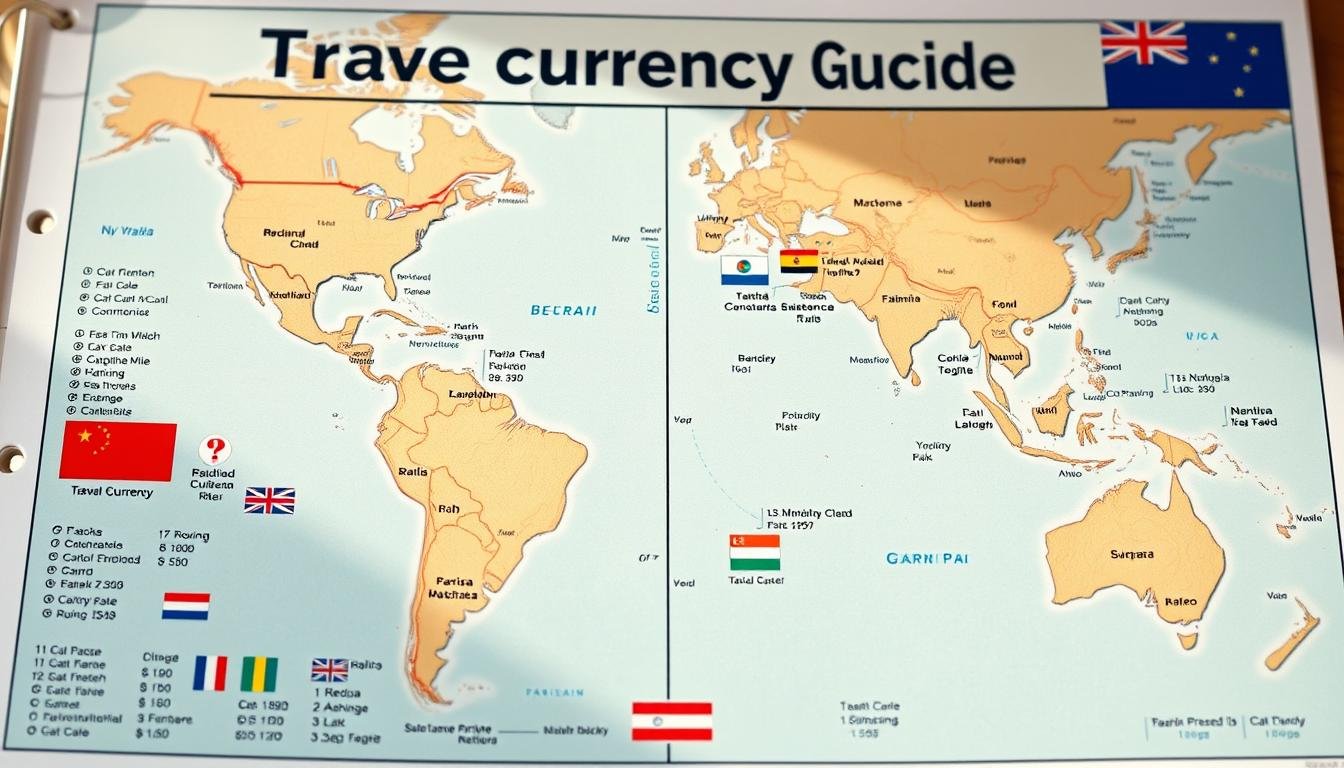✓ Accommodations✓ Flights✓ Rental Cars✓ Tours & Activities
Did you know that over 70% of travelers face challenges with currency exchange or card usage when visiting a new country? Understanding local financial customs is crucial for a smooth journey. This guide is here to help you navigate the ins and outs of handling money in the Northern Mariana Islands.
From planning your currency exchange to using ATMs and credit cards, we’ve got you covered. You’ll also find essential safety tips and advice from trusted sources like the Public Health Agency of Canada. Whether you’re carrying cash or relying on cards, this guide ensures you’re prepared for every financial scenario.
Stay tuned to learn about entry requirements, avoiding hidden fees, and emergency financial strategies. Let’s make your travel experience seamless and stress-free!
Introduction to Currencies and Payments in the Northern Mariana Islands
Handling money in a new destination can be tricky, but knowing the basics makes all the difference. In this section, we’ll guide you through the financial systems and customs you’ll encounter during your stay. From understanding the local currency to navigating payment methods, you’ll be well-prepared for a seamless experience.
Overview of Local Financial Systems
The U.S. dollar is the official currency here, making it easy for travelers from the United States. You won’t need to worry about currency exchange if you’re already familiar with dollars. Most businesses accept both cash and cards, but it’s always good to carry some cash for smaller establishments.
Banking services are widely available, especially in larger towns. ATMs are accessible, but it’s wise to check with your bank about international fees. Credit cards like Visa and Mastercard are commonly accepted, but always confirm with your hotel or service provider beforehand.
What You Need to Know Before You Travel
Before you embark on your journey, take note of these essential tips:
- Entry Requirements: Ensure your visa and passport are up-to-date. Check the latest updates from official sources to avoid any surprises.
- Financial Safety: Keep your cash secure and avoid displaying large amounts in public. Use ATMs in well-lit, secure locations.
- Tipping Customs: Tipping is appreciated but not mandatory. A 10-15% tip is standard for good service in restaurants.
As the Canadian travel advisory suggests, always stay informed about local conditions. Planning ahead ensures a smooth and enjoyable trip.
“Being prepared with financial knowledge is the key to a stress-free travel experience.”
| Payment Method | Acceptance | Tips |
|---|---|---|
| Cash | Widely accepted | Carry small bills for convenience |
| Credit Cards | Common in hotels and larger businesses | Check for foreign transaction fees |
| ATMs | Available in urban areas | Use secure locations |
By understanding these basics, you’ll be ready to handle your finances confidently. A little preparation goes a long way in making your trip memorable and hassle-free.
Understanding Local Currency and Payment Methods
Navigating local currency and payment methods can make or break your travel experience. In this section, we’ll explore how the U.S. dollar shapes the financial landscape and compare the pros and cons of using cash versus cards. By the end, you’ll have a clear plan for managing your money efficiently.

Insights into the U.S. Dollar Usage
The U.S. dollar is the official currency here, making it straightforward for travelers from the United States. You won’t need to worry about exchanging money, which saves time and effort. Most businesses accept dollars, and prices are displayed in this familiar currency.
Using the U.S. dollar also means you can avoid fluctuating exchange rates. This stability is a big advantage for budgeting your trip. Whether you’re dining out or shopping, you’ll find it easy to manage your expenses.
Cash Versus Card Options
Both cash and cards have their place in your travel wallet. Here’s a quick comparison to help you decide:
- Cash: Ideal for small purchases, local markets, and tips. Carrying small bills ensures convenience.
- Credit Cards: Widely accepted in hotels, restaurants, and larger stores. Check for foreign transaction fees before using them.
ATMs are available in urban areas, but fees can add up. Always use secure locations and notify your bank about your travel plans to avoid issues. Some banks also offer fee-free international withdrawals, so it’s worth checking your options.
“Planning ahead with your payment methods ensures a stress-free travel experience.”
Here’s a quick guide to common fees:
| Payment Method | Common Fees |
|---|---|
| Cash | ATM withdrawal fees, currency exchange charges |
| Credit Cards | Foreign transaction fees, potential currency conversion fees |
By understanding these options, you can choose the best way to handle your money. A mix of cash and cards often works well, giving you flexibility and security. With this knowledge, you’re ready to enjoy your trip without financial worries.
Pre-Trip Financial Fortress: Preparing Your Money
Smart money management starts long before you board the plane. Preparing your finances ahead of time ensures a smooth and stress-free trip. From securing competitive exchange rates to avoiding last-minute issues, a little planning goes a long way.
Planning Your Currency Exchange Strategy
One of the first steps in financial preparation is planning your currency exchange. Airport counters often offer less favorable rates, so it’s wise to explore other options. Banks and online platforms typically provide better deals, saving you money and hassle.
Here’s how to get started:
- Research Rates: Compare rates from banks, online services, and local exchange bureaus. Look for competitive offers that align with your budget.
- Order in Advance: Many banks allow you to order foreign currency online. This ensures you have cash on hand when you arrive at your destination.
- Avoid Airport Exchanges: These are convenient but often come with high fees and poor rates. Plan ahead to bypass this pitfall.
“A well-planned currency exchange strategy can save you both time and money, making your trip more enjoyable.”
Additionally, notify your bank about your travel plans. This prevents your cards from being flagged for suspicious activity. Some banks also offer fee-free international withdrawals, so check your options before you go.
By taking these steps, you’ll arrive at your destination with confidence. A solid financial plan ensures you’re ready to focus on enjoying your travel experience.
Currency Exchange Essentials in the Northern Mariana Islands
Getting the best value for your money starts with smart currency exchange strategies. Whether you’re planning your travel or already on the go, understanding how to secure favorable rates can save you time and cash.
Finding the Best Exchange Rates
Exchange rates can vary significantly depending on where you go. Airport counters often offer less favorable rates compared to local banks or currency bureaus. To get the most out of your money, consider these tips:
- Compare Options: Research rates from banks, online platforms, and local exchange services. Online tools like XE Currency Converter provide real-time data to help you make informed decisions.
- Plan Ahead: Order foreign currency from your bank before your trip. This ensures you have cash on hand without relying on last-minute exchanges.
- Use Reputable Agencies: Look for trusted exchange bureaus in your area. These often provide better rates and lower fees than airport counters.
“A little research can save you a lot of money. Always compare rates before exchanging your currency.”
Avoiding Airport Exchange Pitfalls
Airport exchange counters are convenient but often come with hidden costs. Here’s how to avoid common pitfalls:
- High Fees: Airport exchanges typically charge higher fees and offer poor rates. Avoid them unless absolutely necessary.
- Limited Options: These counters may not provide the best value. Use them only for small amounts in emergencies.
- Plan Alternatives: Notify your bank about your travel plans to avoid card issues. Some banks offer fee-free international withdrawals, which can be a better option.
By taking these steps, you’ll ensure a smooth and cost-effective travel experience. A little preparation goes a long way in maximizing your budget.
Utilizing Credit and Debit Cards Effectively
Managing your cards wisely can make your trip smoother and more secure. Whether you’re dining out or shopping, knowing how to use your credit and debit cards effectively ensures you stay in control of your finances. Here’s how to make the most of your cards while traveling.
Managing Foreign Transaction Fees
Foreign transaction fees can add up quickly. To minimize these charges, start by notifying your bank about your travel plans. This prevents your card from being flagged for suspicious activity. Many banks also offer cards with no foreign transaction fees, so consider applying for one before your trip.
Here are some additional strategies:
- Compare Cards: Look for cards that offer low or no foreign transaction fees. Some premium cards even provide travel perks like insurance and lounge access.
- Use Local Currency: When prompted to pay in your home currency or the local currency, always choose the local option. This avoids dynamic currency conversion fees.
- Monitor Statements: Regularly check your card statements for unauthorized charges. Early detection can prevent larger issues.
“Choosing the right card and understanding fees can save you hundreds of dollars during your travels.”
Staying Secure While Using Your Cards
Security is paramount when using cards abroad. Start by keeping your card details private. Avoid using public Wi-Fi for transactions, as it increases the risk of fraud. Instead, use secure networks or a VPN.
Here are more tips to keep your cards safe:
- Enable Alerts: Set up transaction alerts on your phone. This way, you’ll be notified immediately of any suspicious activity.
- Carry Backup Cards: Keep a spare card in a separate location. This ensures you’re not stranded if your primary card is lost or stolen.
- Use RFID Protection: Consider using an RFID-blocking wallet to prevent electronic pickpocketing.
As Mastercard ID Theft Protection advises, monitoring your accounts and staying vigilant can significantly reduce the risk of fraud. By following these steps, you’ll enjoy a safer and more seamless travel experience.
ATMs and Cash Management on the Islands
Accessing cash while traveling is essential, and knowing where to find ATMs can save you time and stress. On Saipan, Tinian, and Rota, ATMs are widely available, making it easy to manage your cash needs. Whether you’re exploring local markets or dining out, having access to your money ensures a smooth experience.

Locating ATMs on Saipan, Tinian, and Rota
ATMs are conveniently located in urban areas, especially near banks, shopping centers, and tourist hotspots. On Saipan, you’ll find them in Garapan and Susupe. Tinian and Rota also have reliable networks, though they may be less frequent. Always check for ATMs near your accommodation or planned activities.
Here are some tips for finding reliable ATMs:
- Use Bank ATMs: These are often more secure and have lower fees compared to standalone machines.
- Check Operating Hours: Some ATMs may not be accessible 24/7, especially in smaller towns.
- Notify Your Bank: Inform your bank about your travel plans to avoid card issues.
“Using secure and reliable ATMs ensures you can access your money safely and efficiently.”
ATM Security and Cash Withdrawal Tips
Safety is crucial when using ATMs. Always choose well-lit, secure locations, preferably inside banks or shopping centers. Avoid using machines in isolated areas, especially at night. Be aware of your surroundings and shield your PIN while entering it.
To minimize fees, consider these strategies:
- Withdraw Larger Amounts: Reduce the number of transactions to save on fees.
- Check Your Bank’s Policies: Some banks offer fee-free international withdrawals or reimbursements.
- Compare Rates: Use ATMs affiliated with your bank to avoid additional charges.
By following these tips, you’ll feel confident about accessing your money during your travel. A little preparation ensures you’re ready for any financial situation.
Northern Mariana Islands: Ultimate Travelers Guide to Currencies & Payments
Traveling with confidence means mastering your financial strategy before you even pack your bags. Whether you’re exploring the United States or venturing further, understanding how to manage your money ensures a smooth travel experience. Here’s how to make payments hassle-free during your trip.
Practical Advice for Cash and Digital Payments
Carrying a mix of cash and cards is often the best approach. Cash is ideal for small purchases, local markets, and tips. Cards, on the other hand, are convenient for larger transactions and offer added security. Always check for foreign transaction fees before using your card abroad.
Here are some tips to keep in mind:
- Notify Your Bank: Inform your bank about your travel plans to avoid card issues.
- Carry Small Bills: Smaller denominations are easier to use and reduce the need for change.
- Use Secure Networks: Avoid public Wi-Fi for transactions to protect your financial information.
“A well-prepared traveler is a confident traveler. Plan your finances to enjoy every moment of your journey.”
Expert Recommendations on Currency Management
Managing your currency effectively can save you time and money. Start by researching the best exchange rates before your trip. Online tools and apps can help you track favorable rates and avoid unnecessary fees.
Consider these strategies:
- Order Currency in Advance: Many banks allow you to order foreign currency online, ensuring you have cash on arrival.
- Use Local ATMs: Withdraw larger amounts to minimize transaction fees, but always use secure locations.
- Monitor Exchange Rates: Keep an eye on fluctuations to exchange money at the best time.
By following these tips, you’ll be well-prepared to handle your finances confidently. A little planning goes a long way in making your trip memorable and stress-free.
Smart Budgeting and Money-Saving Travel Tips
Stretching your travel budget doesn’t have to be complicated—with the right strategies, you can make every dollar count. From finding local deals to tracking daily expenses, these tips will help you travel smarter and save more.

Taking Advantage of Local Deals
Local deals can significantly reduce your expenses. Look for discounts at restaurants, hotels, and attractions. Apps like Groupon often offer group discounts, making activities more affordable when shared with friends.
Here’s how to find the best deals:
- Check Online Platforms: Websites like Student Beans provide exclusive discounts for students on everything from fashion to technology.
- Ask Locals: Locals often know about hidden gems and seasonal promotions that aren’t widely advertised.
- Use Student IDs: Many places offer discounts for students, so always carry your ID.
Managing Daily Expenses Effectively
Keeping track of your spending ensures you stay within budget. Start by setting a daily limit and use budgeting apps like Mint or YNAB to monitor your expenses in real-time.
Here are some practical tips:
- Cook at Home: Preparing meals can save you a lot compared to dining out every day.
- Use Public Transportation: It’s often cheaper than taxis or rideshares.
- Plan Free Activities: Many destinations offer free outdoor excursions or events.
“A well-planned budget allows you to enjoy your trip without financial stress.”
Avoiding Hidden Charges
Hidden fees can quickly add up. Always read the fine print when booking hotels or activities. Some hotels charge daily resort fees or baggage fees, which can inflate your total cost.
Here’s how to avoid surprises:
- Check for Additional Fees: Look for hidden charges like service fees or taxes when booking.
- Use Local Currency: Avoid dynamic currency conversion fees by paying in the local currency.
- Monitor Bank Statements: Regularly check for unauthorized charges to catch issues early.
By following these tips, you’ll be able to manage your money wisely and enjoy your trip without breaking the bank.
Navigating Payment Formats and Cultural Norms
Understanding local payment customs can make your trip smoother and more enjoyable. Every region has its own practices, and adapting to them shows respect and cultural awareness. Whether you’re dining out or shopping, knowing how to handle payments ensures a seamless experience.
Understanding Local Tipping Etiquette
Tipping customs can vary widely. In many places, a 10-15% tip is standard for good service in restaurants. However, some areas may not expect tipping at all. Always observe local behavior or ask for advice to avoid misunderstandings.
Here’s a quick guide to tipping in different settings:
- Restaurants: 10-15% of the bill, unless service is included.
- Hotels: €2-4 per night for cleaning staff, €2-3 per bag for porters.
- Taxis: Round up the fare or add 5-10%.
Payment Practices and Cultural Insights
Payment methods often reflect cultural values. In some areas, cash is preferred for small transactions, while cards are widely accepted in larger establishments. Understanding these preferences helps you blend in and avoid awkward situations.
Here are some practical tips:
- Carry Small Bills: Useful for tips and small purchases.
- Confirm Payment Methods: Always ask if cards are accepted before ordering.
- Respect Local Norms: Follow the lead of locals when unsure.
“Adapting to local payment practices shows respect and enhances your travel experience.”
By understanding these customs, you’ll navigate payments with confidence and enjoy a more immersive travel experience.
Essential Emergency Financial Tips
Emergencies can happen anytime, and being financially prepared is key to handling them smoothly. Whether it’s a sudden travel delay or an unexpected expense, having a plan ensures you stay in control. Here’s how to prepare for unforeseen financial challenges during your travel.

Preparing for Unforeseen Expenses
Start by setting aside an emergency fund. This should cover unexpected costs like medical emergencies, last-minute accommodations, or sudden changes in plans. A good rule of thumb is to save at least 10% of your total travel budget for emergencies.
Here’s how to secure extra cash and backup options:
- Carry Multiple Payment Methods: Bring a mix of cash, credit cards, and a prepaid travel card. This ensures you have options if one method fails.
- Notify Your Bank: Inform your bank about your trip to avoid card issues. Some banks also offer fee-free international withdrawals.
- Keep Emergency Contacts Handy: Save local emergency numbers and your bank’s international helpline in your phone.
“Preparation is the key to handling emergencies with confidence. A little planning can save you a lot of stress.”
Dealing with Sudden Travel Delays
Travel delays can disrupt your plans and lead to unexpected expenses. To stay prepared:
- Book Flexible Tickets: Opt for refundable or changeable flights and accommodations.
- Check Travel Insurance: Ensure your policy covers delays, cancellations, and medical emergencies.
- Have a Backup Plan: Research alternative routes or accommodations in case of disruptions.
By following these steps, you’ll be ready to handle any financial curveballs during your trip. A little preparation ensures you can focus on enjoying your journey, no matter what comes your way.
Conclusion
Mastering your finances before your trip ensures a smooth and enjoyable experience. Understanding local payment methods and safe financial practices is key to avoiding stress. From exchanging money to using cards and managing cash, a little preparation goes a long way.
Always prioritize safety by using secure ATMs and keeping your financial details private. Planning ahead, like notifying your bank and carrying backup payment options, can save you from unexpected issues. Follow expert advice to make your journey hassle-free.
Apply these strategies to enjoy a seamless travel experience. For more tips and resources, explore our guides and stay informed. Remember, being prepared financially is the best way to make the most of your trip.
The above is subject to change.
Check back often to TRAVEL.COM for the latest travel tips and deals.





